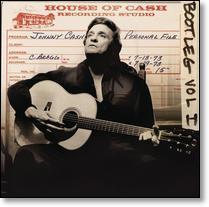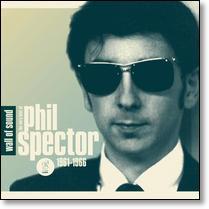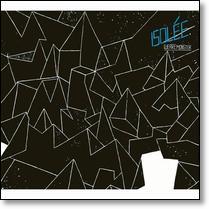A Consumer Guide to the Trailing Edge: June, 2011
Recycled Goods (#86)
by Tom Hull
 |
 |
 |
I'm working harder these days to keep track of new reissues -- the main exhibit is my metacritic file [*] -- but not having much luck in covering them. Don't get much in the mail, and lots of things I look for I can't find on Rhapsody. Then there are things that I can find on Rhapsody but have trouble sitting through; e.g., I found last year's well-reviewed 7-CD Orange Juice box but could only imagine trying to swallow it in one sitting. Even Shout! Factory's new 4-CD Loudon Wainwright box (40 Odd Years) would weigh heavy that way, even as I'm already familiar with almost all of it (cf. my Rolling Stone Album Guide piece). The Phil Spector sets were much easier to handle: I have pretty much everything in other form, plus the new sets are more useful -- I have Spector's Back to Mono box graded B, because while there are great songs everywhere, none of the discs (not even the Christmas album) are straight-through enjoyable. The new single-CD Very Best Of is all that normal people need -- something I can assuredly say even though Rhapsody refused to play "River Deep, Mountain High": one case where my memory can reliably fill in for their shortcomings. The Cash sets were harder to figure: long, obscure -- I understand Greil Marcus wrote the liner notes, which are bound to be a plus even though I normally bristle over his writing. Wound up cutting them some slack, but that only seemed right.
Still, most of what follows was hit by accident. Some world music things I still get, some side glances -- thought I'd check the Cars' canonical set after hearing their reunion album, found the old Isolée alongside the new one, checked out the old Presley after I saw it on sale cheap (still not worth it, but by all means seek out Tiger Man), always wanted to hear more by Tubby Hayes. This stuff is still adding up: 2970 records reviewed since 2003. I've only topped 20 records twice in the last 6-8 months (33 once, 27 another time, both jazz-heavy), so the odds are against passing 3000 next month, but it's not a big stretch. Will happen before it cools off here.
[*] Seems likely that I've miscalculated the Johnny Cash Bootleg sets in this file, since I only had Vol. II listed, and Vol. I is much the better set. They seem to have come out on the same date. Will have to recheck -- a tedious job I'm not looking forward to.
Art Blakey & the Jazz Messengers: The Sesjun Radio Shows (1978-83 [2011], T2 Entertainment, 2CD): The second in a series of radio shots from Tros Sesjun in the Netherlands -- Chet Baker came out first, last year. Blakey was one of the three drummers who put bebop on the map (Kenny Clarke and Max Roach were the others), the first guy who figured out how to play with Thelonious Monk, and the inventor of hard bop -- all but synonymous with Blakey's 1953-66 Jazz Messengers, where he picked up a series of virtually unknown young musicians and turned them into: piano players like Horace Silver, Bobby Timmons, and Wynton Kelly; saxophonists like Jackie McLean, Hank Mobley, and Wayne Shorter; and trumpeters like Kenny Dorham, Lee Morgan, and Freddie Hubbard. He fell on hard times in the late 1960s, but the idea that he could run a finishing school made for a comeback that peaked in 1980 when he tutored two young Marsalis brothers. These three sets bracket the Marsalis Messengers; they're not in any of the lineups, but Bobby Watson and Donald Harrison play alto; David Schnitter, Billy Pierce, and Jean Toussaint tenor; Valery Ponomarev and Terence Blanchard trumpet. The hardest boppers are in the mid-1980 group (Pierce, Watson, and Ponomarev, with James Williams on piano and Charles Fambrough on bass), their set spread across the two discs, and Blakey responds as usual, playing even harder. B+(**)
Johnny Cash: Bootleg Vol I: Personal File (1973-83 [2011], Columbia/Legacy, 2CD): Forty-nine songs recorded solo in the privacy of Cash's studio, more originals than covers but not by much, some with intros, some effectively poems without the guitar kicking in. One especially tasty sequence goes north for "Saginaw, Michigan," follows with "When It's Springtime in Alaska," Cash's own "Girl in Saskatoon," and the tall tale of "The Cremation of Sam McGee." Less inspired is the long series of Jesus songs on the second disc, but where the originals are sketchy and idiosyncratic, the disc closes with three classics. A- [R]
Miles Davis: Bitches Brew Live (1969-70 [2011], Columbia/Legacy): Something of a misnomer, combining three previously unreleased cuts from a pre-Bitches Brew July 1969 performance at Newport with six from an Isle of Wight set the following August. Neither group matches the album band -- Wayne Shorter, John McLaughlin, and Joe Zawinul are among the missing -- nor do the songs line up. The former group was stripped down with Chick Corea, Dave Holland, and Jack DeJohnette; the latter was buffed up, adding Gary Bartz, Keith Jarrett (on organ), and Airto Moreira. So this is basically yet another live set from the period when Davis made his transition from hard bop to fusion, and from dingy jazz clubs to stadia. Pretty hot one, too; all the more confusing since I mostly recall Bitches Brew as our favorite chill-out album of the early 1970s. B+(***)
Lajos Dudas: 50 Years of Jazz Clarinet: The Best of Lajos Dudas (1976-2007 [2011], Jazz Sick, 2CD): Clarinet player, also some alto sax, b. 1941 in Budapest, Hungary; not sure when he moved to Germany, evidently by 1973 when he started teaching in Neuss, North Rhine-Westphalia. Reportedly has "over 50 Singles/LPs/CDs"; liner notes cite 17 here, plus seven cuts identified as radio shots. Fifty years goes back to his first performances, back when he was studying at the Bela Bartok Conservatory and the Franz Liszt Academy of Music. His recording career is shorter, starting around 1976 with his first Reflections on Bach -- a subject he returns to several times later. Still, this is very much jazz, even though he hardly fits into the trad, bop, or avant niches. Discs aren't strictly chronolgical, but the first one leans early (1978-94) with its Bach, Liszt, and HR Big Band (also a cut with guitarist Atilla Zoller). Second leads off with a vigorous "Summertime," then more Bach before he moves into a 1995-2007 stretch and it gets more interesting. B+(**)
Blaze Foley: Duct Tape Messiah [Soundtrack From the Documentary Film] (1975-89 [2011], Lost Art): Michael David Fuller, better known as Blaze Foley, better still as Lucinda Williams' "Drunken Angel," lived from 1949-89, finally giving it up not to alcohol but to a bullet in the chest, the killer acquitted by reason of self-defense. Don't have any doc on this, but it claims to "span Blaze's musical life," leading off with a single released in 1979 ("Let Me Ride in Your Big Cadillac") but also appeared near the top of The Dawg Years dating 1975-78 and on another posthumous compilation dated "mid-1970s" (Sittin' by the Road, on Lost Art). Fact is, with Foley it's pretty much all posthumous: five records now on Lost Art, one on Waddell Hollow, Dawg Years on Fat Possum, all scraped up from practically nothing. A few good songs loosely done, most neither deep nor weird enough to care for unless knew and cared for him, which some folks did, otherwise he'd be as forgotten as he is dead. B+(**) [R]
Wall of Sound: The Very Best of Phil Spector 1961-1966 (1961-66 [2011], Phil Spector/Legacy): One producer of the Brill Building era whose records are remembered under the producer's name rather than the artists' names. Part of the reason was that he had a name for his production technique -- Wall of Sound -- and part of it was because along with Lester Sill he owned his own label, Philles Records, and assiduously kept his records segregated from all other doo-wop and girl group anthologies, where they might have just fit in, and where many would not stand out. Instead, the records have slipped in and out of print, with rare compilations mixing his key girl groups (the Crystals and the Ronettes) in with juvenilia and the operatic excess of his decline. I've owned two of these -- the 1977 2-LP Phil Spector's Greatest Hits and 1991's Back to Mono box, the former's 20 songs a bit much, the latter's 4 CDs (including his 1963 Christmas album) an open dare for you to start programming around the dreck. In his 70s now, serving 19-years-to-life for second degree murder, he's back finally in print now, his oeuvre reduced to 19 songs (53:39) on one disc, about right -- in fact, most classic, even once he discovered strings and a percussionist named Sonny Bono: in fact, climaxing with "River Deep, Mountain High," you can see why so many people thought he had a plan all along. I'll just note that every great song he put his name to was co-credited to others, usually Barry-Greenwich or Mann-Weil. A [R]
Briefly Noted
The Cars: Greatest Hits (1978-85 [1985], Elektra): Reduces five of six 1978-87 albums to fourteen tracks, giving you a sense of the hook-laden guitar grooves they tried to replicate in their 2011 reunion; the more expensive 20-cut Complete Greatest Hits adds one cut from the last album and three more from their eponymous first -- but this covers them adequately. B+(**) [R]
Johnny Cash: Bootleg Vol II: From Memphis to Hollywood (1955-69 [2011], Columbia/Legacy, 2CD): The early stuff from his first radio shot at KWEN, reading aluminum siding ads and promising to learn new songs if listeners will write in and request them, is little short of embarrassing; his Sun demos are starkly unadorned, lacking the Tennessee Two rhythm that made his Sun singles so great, but we find the simplicity suits him as he moves on to Columbia, songs that would be slaughtered for filler regaining their dignity. B+(**) [R]
Da Doo Ron Ron: The Very Best of the Crystals (1961-63 [2011], Phil Spector/Legacy): Spector's flagship girl group, which made them his primary targets of abuse, running through three lead singers -- Barbara Alston, Darlene Love, and Dolores Brooks -- in a bit over two years, each good for a pair of top-20 singles, with only "He Hit Me (It Felt Like a Kiss)" falling flat -- even more explicit was the non-single "Please Hurt Me"; the filler gets stronger toward the end, thanks to Barry-Greenwich. B+(**) [R]
The Tubby Hayes Quintet: Late Spot at Scott's (1962 [2006], Verve): Live set at Ronnie Scott's, home base for England's foremost tenor saxophonist of his brief heyday (d. 1973 at 38); an energetic hard bop quintet, with underrated Jimmy Deuchar on trumpet and better known Gordon Beck on piano, does some interesting things on the ballad "Angel Eyes" then breaks loose, especially on the burner "Yeah!" B+(**) [R]
Isolée: We Are Monster (2005 [2011], Pampa): Rajko Müller's second album, reissued as he moves to a new label, picks up minimal house beats and flings off witty synth asides, more echo slides than blips or twiddles, although there are some of those too; hard to tell how electronica will wear, but this keeps coming back -- every time I start to zone something tickles my fancy. A- [R]
Femi Kuti: Africa for Africa (2010 [2011], Knitting Factory): Fela's eldest son, grew up in his father's band, also plays alto sax, continues the family trade: the beats, the sax wails, the chant vocals -- political rants in pidgin English, "Bad Government" one title you can believe. B+(**)
Ladytron: Best of 00-10 (2000-10 [2011], Emperor Norton): Standard edition, 17 tracks, although they also have a 2-CD 33-track deluxe option that I haven't sampled; English pop group, mostly synths fronted by vocalists Mira Aroyo and Helen Marnie, as tronic as the synths; can't say a single song stood out, least of all badly. B+(*) [R]
Vesa-Matti Loiri: 4+20 (1971 [2011], Porter): Finnish jazz and poetry bash, the leader playing flute and singing, sometimes cartoonishly, while piccolo, sax, guitar, and lots of percussion romp all around; label has done much to shed light on Finnish jazz notables such as Eero Koivistoinen and Pekka Sarmanto, and this is where that devotion winds up. B+(*)
The Sound of Love: The Very Best of Darlene Love (1962-75 [2011], Phil Spector/Legacy): Leads off with her two great Crystals singles -- "He's a Rebel" and "He's Sure the Boy I Love" -- and tacks on two of her more retro Bob B Soxx & the Blue Jeans leads, splitting the difference on her own marquee songs like "Today I Met the Boy I'm Gonna Marry" and "A Fine, Fine Boy"; ends with a post-Philles single Spector somehow controls. B+(**) [R]
Elvis Presley: An Afternoon in the Garden (1972 [1997], RCA): A typical period set dumped off 25 years after the fact, almost the same as the previously released As Recorded at Madison Square Garden, from the opening strains of "Also Sprach Zarathustra" through the ridiculously bloated "American Trilogy," stopping off for a handful of 1950s hits; sounds a bit scrawny at first, but picks up steam on the way. B [R]
Don Pullen: Plays Monk (1984 [2010], Why Not?): The last pianist to work for Charles Mingus is an odd choice to play Monk, and I suspect he gave little thought to the project; he keeps wanting to work in his trademark flourishes, dazzling of course, but excess baggage especially when playing songs that hide their odd note choices in a cloak of primitivism. B [R]
Be My Baby: The Very Best of the Ronettes (1963-66 [2011], Phil Spector/Legacy): Girl group, led by Veronica Bennett, later known as Ronnie Spector, had been together for several years before Phil Spector took them over, introducing them with their sole hit single, arguably Spector's finest three minutes: "Be My Baby"; after that "Baby, I Love You," "(The Best Part of) Breakin' Up," and "Walking in the Rain" fell short of top-20, but Spector's mono-faced kitchen sink sound gives nearly everything a unifying force -- although a couple clunkers near the end make you wonder. B+(***) [R]
The Sway Machinery: The House of Friendly Ghosts Vol. 1 (2010 [2011], JDub): Brooklyn collective centered around Balkan Beat Box guitarist-vocalist Jeremiah Lockwood, "inspired by ancient Jewish Cantorial music, blues, afro-beat and rock," goes to Mali's Festival in the Desert and comes back with featured singer Khaira Arby and guests like Djilmady Tounkara and Vieux Farka Touré, mixing it up with horns from Antibalas; sounds interesting, and is, but the parts clash more than mesh, and much of the interest comes from the wreckage. B+(*) [advance]
Max Wild: Tamba (2008 [2010], ObliqSound): Alto saxophonist from Zimbabwe, plays a slick variant of township jive with a little Afrobeat thrown in, the dance groove topped with vocals by Sam Mtukudzi, Chiwoniso, and Alicia Olatuja, with Danish jazz pianist Soren Moller thrown in for good measure. B+(**)
Legend: B+ records are divided into three levels, where more * is better. [R] indicates record was reviewed using a stream from Rhapsody ([X] is some other stream source). The biggest caveat there is that the packaging and documentation hasn't been inspected or considered, and documentation is especially important for reissues. But also my exposure to streamed records is briefer and more limited, so I'm more prone to snap judgments.
For this column and the previous 85, see the archive.
Copyright © 2011 Tom Hull.